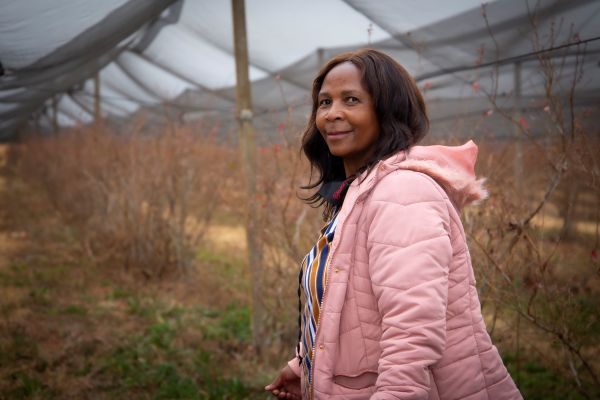Land Reform: As discussions about the efficacy and direction of the land reform programme continue, there is scant attention being paid to the role that women are playing in the sector, despite women owning and operating approximately 20% of farming units – according to the Department of Agriculture – and accounting for a third of the 896 000 strong agricultural workforce in the second quarter of 2024, according to the 2024 StatsSA Quarterly Labour Force Survey.
South Africans across all walks of life are celebrating Women’s Month in August to highlight the milestones that women have achieved and to shine a spotlight on the challenges that hamper women in achieving their full potential in various spheres of life.
Reflecting on the role that women play at the coal face of the land reform programme, Sibongile Ntloko-Tabata, Managing Director of Sisata Management Services, says that though women comprise a critical mass in the agricultural sector and as beneficiaries of the land reform programme, they remain largely underrepresented in decision-making positions.
Sisata Management Services bridges the gap between communities, government, and the private sector, ensuring that development projects in areas affected by land reform are participatory, inclusive, and sustainable.
“Cultural norms, structural inequalities, and limited access to capital still hinder women from taking leadership roles in the sector,” says Ntloko-Tabata. “It is disheartening that patriarchal practises continue to stifle the potential of women in land reform, particularly on restituted land, when they have been shown to bring a developmental and people-centered approach that transforms the land into a productive, inclusive, and sustainable resource prioritising food security and livelihoods.”
She says land reform should not be seen as a way of only correcting the past but also about creating opportunities for inclusive growth, sustainable agriculture, and food security. She says if that could be the main focus, then greater success and impact would be achieved.
To that end, Ntloko-Tabata says women need equal access to training, decision-making platforms, and financing. “Policies must go beyond quotas to ensure women have the skills, networks, and confidence to influence outcomes,” she says. “We need tailored business development programmes for women, mentorship from experienced female entrepreneurs, and financial products that account for the realities women face, such as limited collateral.”
Winnie Pooe, Deputy Chairperson of the Coromandel Farmers Trust, says spiralling unemployment which disproportionally impacts black women, presents opportunities for women to consider pivoting and creating a livelihood in the agricultural ecosystem.
South Africa’s unemployment rate rose for the second quarter in a row to 33.2% in April-June, up from 32.9% in January-March, according to the latest Quarterly Labour Force Survey (QLFS) from StatsSA. StatsSA said the number of unemployed people increased to 8 367 million in the second quarter, which makes the figures one of the highest in the world.
“The scarcity of job opportunities in our country renders opportunities created by the land reform programme a viable option for women and for young people who are adversely affected by joblessness. The agricultural sector is a dynamic industry with an extensive ecosystem where women and young people can create entrepreneurship and employment opportunities,” says Pooe.
Pooe’s sentiments about untapped opportunities in the land reform space were echoed by Mpho Thaba, Programmes and Office Administrator at Vumelana Advisory Fund. Thaba points out that women are at the forefront of driving projects, working the land, and managing finances in many farming communities. “What’s really stood out to me is their resilience and commitment – even when faced with challenges, women continue to push for progress and look after their families and communities at the same time,” she says.
She points out that there are misconceptions about the land reform programme, with many people thinking that it is just about giving land back or that land allocation is a silver bullet that can alleviate poverty.
“What’s often misunderstood is that land alone isn’t enough – people also need support, funding, and skills to use that land in a way that helps their lives and communities. Some also think land reform is a quick fix, but it takes time, planning, and teamwork. It’s not just a government issue either – everyone has a role to play, including private sector partners and the communities themselves,” she says.
Pooe advised women who are interested in venturing into agriculture to connect with people already working in the space, to ask questions, and to volunteer where possible to learn the ropes. “Don’t be shy to reach out for guidance. Land reform and development need fresh ideas and strong voices, especially from young women. Believe in your value, stay curious, and keep learning. It’s not always easy, but your contribution can make a real difference,” she says.
Citing the export figures from Trade Map, Chief Executive of the Vumelana Advisory Fund, Peter Setou says the South African agricultural sector achieved a record high of about R255 billion in 2024. He echoed that AGOA has played a critical role in trade with the United States. The US accounts for about 4% of SA’s agricultural exports. Products such as citrus, grapes, wine and fruit juices have benefitted from duty access. With the exclusion from AGOA South Africa faces tariffs that will make it harder to compete against countries with duty free access or lower tariffs.
“Whilst the changes will no doubt have an impact on South Africa and the economy, the land reform programme must be supported and positioned to benefit from market expansion to BRICS countries, Africa as well as other strategic export markets. We need to work in concert to come up with innovative solutions that will not only ensure that we speed up the land reform programme, but that we do so in a way that integrates women in decision making and participate in the value chains such as agro-processing in a meaningful way,” Setou concludes.








